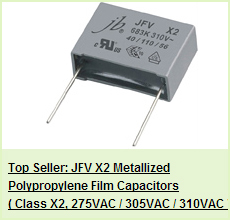Choosing Mini Film Capacitors for Signal Stability in Compact Circuit Designs
In today’s fast-evolving electronics world, designing circuits that are both efficient and reliable is essential. Whether you're working on consumer electronics, high-speed communication devices, or compact systems, maintaining signal integrity is critical. One key component that plays a significant role in ensuring signal stability is the mini film capacitor. In this article, we’ll dive into why mini film capacitors are crucial for compact circuit designs, and how you can select the right one to optimize performance.
Why Signal Stability Matters
Signal stability is vital for the performance of electronic circuits. In high-speed systems, such as wireless communication devices, data processors, and audio systems, even the slightest disruption in signal transmission can cause significant issues like data errors, delays, or signal loss. Mini film capacitors help ensure that signals are transmitted clearly and without distortion, even under demanding conditions.
Mini film capacitors are designed to provide low dissipation factors, ensuring minimal energy loss, and their self-healing properties help restore functionality after electrical stress. These features contribute to maintaining signal integrity and reliability, preventing common issues like signal delays or power loss.
Key Advantages of Mini Film Capacitors
- High-Frequency Performance
Mini film capacitors are well-suited for high-frequency circuits, offering ultra-low losses and maintaining signal clarity even at higher speeds. - Compact Design
Their small size allows them to fit in high-density circuits without sacrificing performance, making them ideal for use in modern, space-constrained applications. - Improved Reliability
A key feature is their self-healing effect, which extends their lifespan and improves overall reliability. - Durability in Harsh Conditions
Many mini film capacitors are designed to withstand high temperatures and extreme environmental conditions, making them suitable for a wide range of electronic devices.
Selecting the Right Mini Film Capacitor for Your Circuit
When choosing a mini film capacitor for your circuit, consider:
- Capacitance Value and Tolerance
Choose the right capacitance and tolerance to ensure your circuit works as intended. - Voltage Rating
Select a capacitor with a voltage rating higher than your circuit’s operating voltage to prevent breakdown. - Temperature Range
Ensure the capacitor can handle your circuit's operating temperature. - Self-Healing and Reliability
Look for capacitors with self-healing properties for long-term reliability.
Common Applications of Mini Film Capacitors
- Consumer Electronics
Used in smartphones, wearables, and other compact devices to maintain signal integrity. - Communication Devices
Ensure clear transmission of signals in RF communication systems and IoT devices. - Automotive Electronics
Used in control units, sensors, and infotainment systems. - Industrial Applications
Provide reliable signal processing in machinery and control systems.
Conclusion
Choosing the right mini film capacitor can significantly impact the performance and longevity of your circuit. By selecting capacitors that offer excellent signal stability, compact size, and high reliability, you ensure that your designs operate efficiently, even in space-constrained environments.
Get in Touch with Us
Email: info@jbcapacitors.com
Website: www.jbcapacitors.com
Product Page: Polypropylene Film Capacitors

